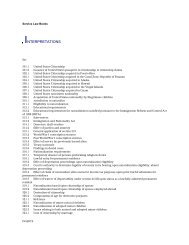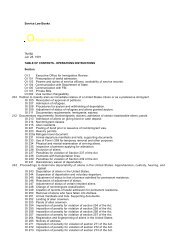Create successful ePaper yourself
Turn your PDF publications into a flip-book with our unique Google optimized e-Paper software.
<strong>Inspector's</strong> <strong>Field</strong> <strong>Manual</strong><br />
Chapter 4: Research.<br />
4.1 General Considerations.<br />
As an immigration officer, you will often encounter novel issues or factual situations. In the course of your<br />
duties, you will also be exposed to other areas of immigration law that may have a bearing on the action you<br />
take. The correct resolution of these issues, or whether they are relevant at all, will not always be apparent. Even<br />
when an outcome is clearly apparent, you should always provide a basis for an action grounded in legal<br />
authority. There will thus be occasions when you will need to perform research before you make a decision.<br />
This chapter will seek to familiarize you with some of the basic methods of legal research and with the general<br />
organization of the immigration law.<br />
It is important to remember that you must take an active role as an officer. Not every situation will be the same,<br />
and not every situation will suggest an easy resolution. You must be on the lookout for issues and circumstances<br />
which can affect your decision. Creative thinking and a willingness to "dig" beneath the surface will make you a<br />
more effective officer. This manual, along with the new administrative manual, reflects the Service's<br />
commitment to improve availability of timely and complete policy information for its officers. Referring to the<br />
Act and the regulations are only the beginning of your duties as a Service officer. Supplemental materials<br />
provide insight into the regulations and clarify your legal duties.<br />
4.2 Sources and Organization of Immigration Law.<br />
The Immigration and Nationality Act (the Act, INA) is the major source of immigration law. Any lawful action<br />
by the Service or by any of its officers must be traced back to and authorized by the provisions of the Act.<br />
Provisions of the Act are often referred to by their position within the Act. Thus "section 245" refers to that<br />
section of the Act. The Act itself, part of the larger U.S. Code system, is contained at 8 U.S.C. §§ 1-1434, and<br />
particular sections are frequently referred to by their U.S.C. citation rather than their INA citation (e.g. section<br />
245 of the INA may also be referred to as 8 U.S.C. 1255.)<br />
The other major source of authority in immigration law is the Code of Federal Regulations. When Congress<br />
passes a provision of law, it often delegates authority to implement the law to the agency, consistent with the<br />
terms of the statute. Congress may provide that a certain class of aliens may be eligible for a particular benefit,<br />
but it is not until the Service issues regulations concerning details such as application procedures, filing fees, etc.<br />
that the statutory provisions come to life. Regulations, though not issued by Congress, have the same force and<br />
effect as the statute. The Service's regulations are contained in Title 8 of the Code of Federal Regulations (CFR).<br />
Generally, but not exclusively, the numbering of the regulations tracks the numbering of sections in the Act. Rules<br />
dealing with section 245 of the Act would thus be found at 8 CFR part 245. Other parts of the Code of Federal<br />
Regulations may have an effect on immigration issues. This is especially so with State Department regulations,<br />
which can be found at 22 CFR. Generally, whenever you see a statutory citation, the relevant CFR title will track<br />
the United States Code title, so that 7 U.S.C. will lead you to 7 CFR.<br />
While the statute and regulations are the primary source of law, materials that interpret these are also an<br />
important source. The Board of Immigration Appeals (BIA) in Falls Church, Virginia is the major appellate<br />
body deciding immigration matters. Its decisions have the force of law and are binding upon Service officers.<br />
Significant BIA decisions are published and indexed to make them readily accessible by Service employees as<br />
well as the general public. Appeals are taken to the BIA from Service decisions on adjudicative matters such as<br />
visa petitions and adjustment of status petitions, and are also taken from Immigration Court on matters such as<br />
deportability and excludability and relief from deportation. The Office of the Chief Administrative Hearing<br />
Officer (OCAHO) is similar, except it hears cases dealing only with fines and penalties. Internally, directives<br />
designated "P" following their file number and issued in the form of memoranda and cables, are binding on<br />
Service employees as are other policy issuances such as the materials contained in INSERTS (Immigration and<br />
Naturalization Service Easy Research and Transmittal System). Many cases not appealable to the BIA are<br />
appealable internally to the Administrative Appeals Office (AAO). Although less frequent, that office may also




